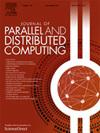用于气候和污染监测的能量感知传感器网络设计
IF 3.4
3区 计算机科学
Q1 COMPUTER SCIENCE, THEORY & METHODS
引用次数: 0
摘要
人们对气候变化和污染的日益关注推动了用于环境监测的高能效传感器网络的发展。本研究提出了一种使用生成树-强化学习(ST-RL)的能量感知传感器网络,以优化数据准确性、最小化能耗并延长网络寿命。与现有方法相比,所提出的方法能显著提高性能。实验结果表明,与 EDAL、FT-EEC 和 EAEDAR 等传统方法相比,ST-RL 可将网络寿命延长 28.57%,能耗降低 41.24%,数据包传送率提高 3.7%,传输延迟降低 10%。数据收集自多个环境传感器,使用生成树算法进行处理以优化连接性,并通过强化学习来抑制不必要的传输。研究结果证实,所提出的 ST-RL 技术能显著提高能源效率和网络可靠性,是大规模气候和污染监测应用的理想解决方案。本文章由计算机程序翻译,如有差异,请以英文原文为准。
Design of energy-aware sensor networks for climate and pollution monitoring
The growing concern over climate change and Pollution has driven the development of energy-efficient sensor networks for environmental monitoring. This research proposes an energy-aware sensor network using Spanning Tree-Reinforcement Learning (ST-RL) to optimize data accuracy, minimize energy consumption, and extend the network's lifetime. The proposed method achieves significant performance improvements compared to existing approaches. Experimental results demonstrate that ST-RL enhances network lifetime by 28.57 %, reduces energy consumption by 41.24 %, improves packet delivery ratio by 3.7 %, and reduces transmission delay by 10 % over traditional methods such as EDAL, FT-EEC, and EAEDAR. The data is collected from multiple environmental sensors, processed using spanning tree algorithms for optimized connectivity and refined with reinforcement learning to suppress unnecessary transmissions. The results confirm that the proposed ST-RL technique significantly enhances energy efficiency and network reliability, making it a promising solution for large-scale climate and pollution monitoring applications.
求助全文
通过发布文献求助,成功后即可免费获取论文全文。
去求助
来源期刊

Journal of Parallel and Distributed Computing
工程技术-计算机:理论方法
CiteScore
10.30
自引率
2.60%
发文量
172
审稿时长
12 months
期刊介绍:
This international journal is directed to researchers, engineers, educators, managers, programmers, and users of computers who have particular interests in parallel processing and/or distributed computing.
The Journal of Parallel and Distributed Computing publishes original research papers and timely review articles on the theory, design, evaluation, and use of parallel and/or distributed computing systems. The journal also features special issues on these topics; again covering the full range from the design to the use of our targeted systems.
 求助内容:
求助内容: 应助结果提醒方式:
应助结果提醒方式:


